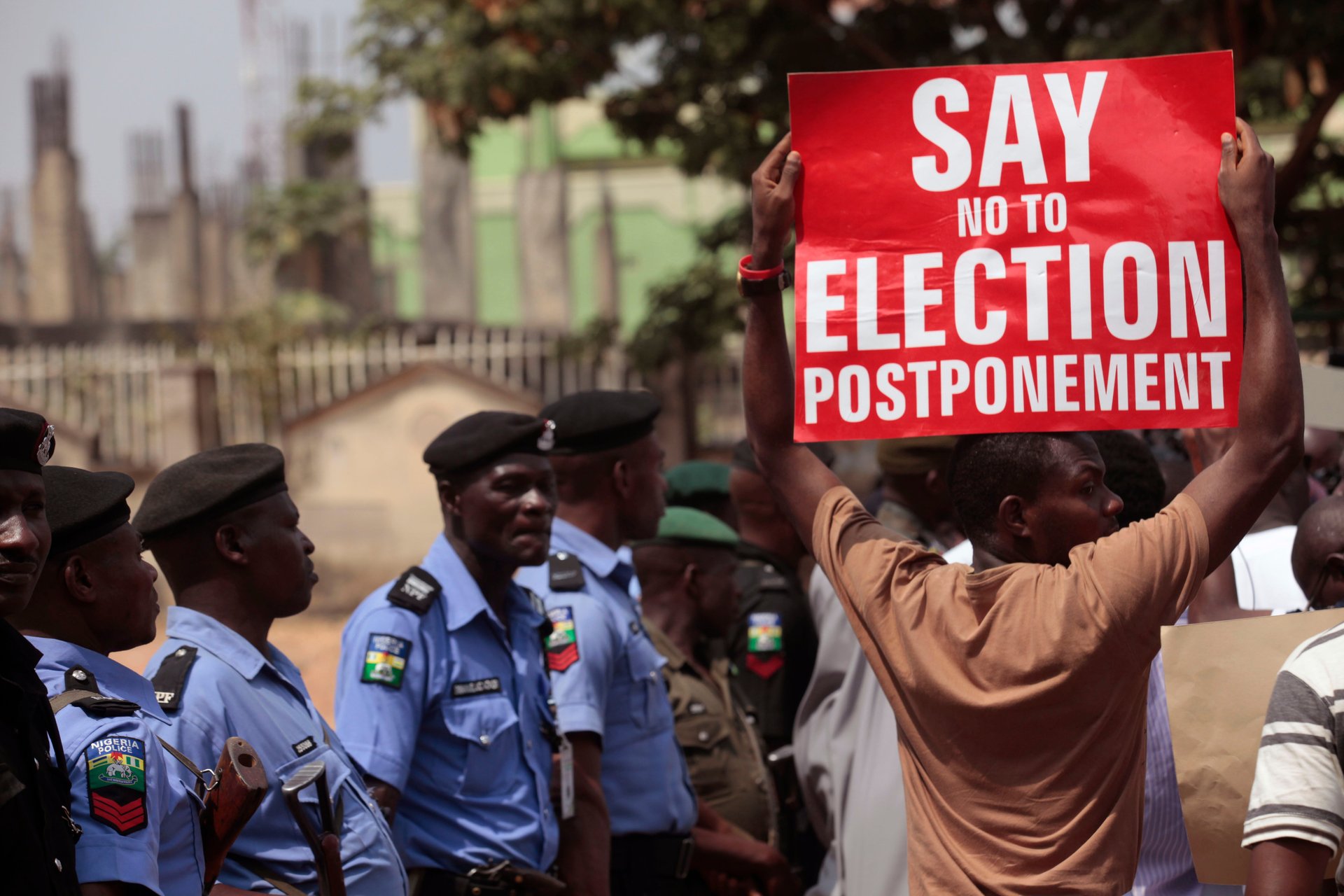Yes, Nigeria’s on the brink—but that’s no cause for alarm
The postponement of the Nigerian presidential elections—the security forces have told the Independent National Electoral Commission they are too busy fighting the Boko Haram insurgency to secure the vote—has sparked the kind of speculation and conspiracy theories you might expect from a young and fragile democracy.


The postponement of the Nigerian presidential elections—the security forces have told the Independent National Electoral Commission they are too busy fighting the Boko Haram insurgency to secure the vote—has sparked the kind of speculation and conspiracy theories you might expect from a young and fragile democracy.
The inevitable narrative, at home and abroad, is that this is a ruse by President Goodluck Jonathan, designed to give him more time to get his act together and beat challenger Muhammadu Buhari, a retired general, at polls rescheduled by six weeks to March 28.
The delay has also revived the predictable Nigeria’s-on-the-brink thesis, as discussed recently by the U.S. house committee on foreign affairs. This sort of alarm is raised every few years, especially in the run-up to an election. Nigeria dancing on the brink was the title of former U.S. ambassador John Campbell’s 2010 book about his time in Africa’s most populous country. Now with the Council of Foreign Relations, Campbell writes:
“An unstable Nigeria with internally displaced and refugee populations and a government unable to quell Boko Haram could potentially destabilize neighboring states and compromise U.S. interests in Africa.”
He’s not alone. The Financial Times writes:
“At stake is the continued transformation of Africa’s leading economy—among the fastest growing in the world over the past 15 years—and in the most extreme scenario, Nigeria’s ability to hold together as one nation.”
Roddy Barclay, an analyst at Control Risks tells Quartz the closeness of the vote places a different cast on this election.
“With a genuine contest for the presidency, Nigeria is stepping into the unknown and this is placing enormous pressure on the electoral process.”
These analysts are well-meaning, and their concern for Nigeria does them credit. They are also wrong. For all its political dysfunction, Nigeria has demonstrated again and again that it can survive chronic instability, even chaos. Count on it to do so again.
Make no mistake, Nigeria has not faced an adversary as deadly and resilient as Boko Haram, certainly not since the civil war in the sixties. As of this month, the terrorists have claimed nearly 20,000 lives and displaced more than 3 million people in the country’s northeast.
Tanking economy
At the same time, the price of oil, which generates some 90% of the country’s foreign reserves, is down more than 50% since last summer. The stock market and currency have followed suit—the Naira is down more than 20% since July.
Then there’s the real fear that the closely fought election will leave very sore losers on one side, leading to post-electoral violence and more upheaval.
These are real problems, real challenges.
Yet, at some level, it was ever thus: Nigeria has been permanently in a state of near-crisis. This is has been true of its democratic process since 1993, when elections were upended on June 12, ushering in the brutal military rule of Gen Sani Abacha. There was uncertainty after Abacha suddenly died in mysterious circumstances, and with the transition to the civilian rule of former president Olusegun Obasanjo in 1999.
The country was back in crisis mode again around when Obasanjo’s successor, president Umaru Yar ‘Adua, died in office in 2010. Then there was the Niger-Delta insurgency crisis, and the controversy around president Jonathan’s decision (registration required) to stand for a second term, breaking his promise to only rule for one term.
On the brink? Yes, that’s where Nigeria lives.
This is why everyone—from Jonathan and Buhari to ex-presidents —dismiss the Nigeria-could-collapse narrative. Nigeria always pulls back from the brink because the same characters who play leading roles in taking it there are the same people who drag it back.
“I want to say even when we get to the rubicon, we will pull back and Nigeria will remain the same. We will remain one and that will happen in 2015,” said Central Bank of Nigeria governor Godwin Emefiele in an interview on CNBC Africa on Thursday.
Even Obasanjo, who earlier in the week raised alarms about the election postponement in the Financial Times was soon was back to championing a positive Nigeria outlook despite the challenges. On Thursday at the launch of his book in London, he described the country’s future as “very rosy”, pointing out the country had been through similar upheavals in the past, including the civil war, but came out as a stronger nation.
“God will see Nigeria through. Nigeria will emerge successfully and move up and forward,” he said.
This time is different, but betting on a markedly different outcome where Nigeria is concerned is like betting against the house. The house always wins.